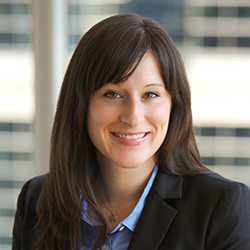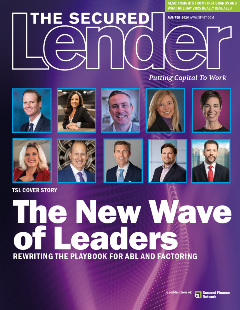
Tabitha Humphries
Associate, Skadden, Arps, Slate, Meagher & Flom LLP
40 Under 40 Category: Legal Services
Biography:
Tabitha Humphries represents borrowers and lenders in connection with various types of financing transactions in a variety of industries, including investment-grade lending, acquisition financings, asset-based loan facilities, leveraged loans, cross-border secured credit facilities, secured note facilities, restructurings and workouts, debtor-in-possession financings and exit financings. In her role on the Skadden Women Excelling in Law and Leadership (SWELL) steering committee, Tabitha develops programming aimed at helping young women attorneys develop networking skills, establish relationships in the community, and addresses women-specific work-related issues. Tabitha also maintains an active pro bono practice, with a particular focus on immigration work. She sits on the steering committee for the firm’s Immigration Impact Project and helps develop best practices, streamline case precedent, policy information, templates and other resources. She is also active in her local community, serving on the associate board of directors for Growing Home, an organization whose mission is to operate, promote and demonstrate the use of organic urban agriculture as a vehicle for job training, employment and community development.
What is the best professional advice you have been given and how have you implemented it?
When I was a junior associate, I had the opportunity to work directly under a senior partner in an overseas office. Early in the deal, he called me to ask what a certain phrase meant in a contract that I had reviewed. I hadn’t edited the phrase from the original draft, and, to my chagrin, I didn’t really know what it meant. He quickly told me, “If you don’t understand it, no one else does either. Strike it out.” That simple direction cut through my imposter syndrome – a feeling of uncertainty that I’m sure many humanities majors have when starting out in the finance field. Even though the guidance came out of a mistake, it gave me a confidence boost. I thought, if this senior partner has confidence in my abilities, I surely should, too. Implementing this advice, by always asking questions or redrafting contracts when terms are unclear, and not assuming that everyone else knows what’s going on when I don’t, allowed me to take ownership of deals and made me a much better attorney.
How would you encourage young professionals to become more involved in their community or volunteer? How have these activities outside of work helped shape your professional life?
Now is a great time for young professionals to reflect upon our positions of privilege and recommit to making long-term, positive social impacts. While we’re living in the midst of an extraordinary civil rights movement, and opportunities to volunteer, protest and donate abound, it’s important to structure our lives so that involvement in the community is a constant element and not an occasional exception. There are several ways to do this, but there are four strategies that work for me. First, work for an organization that aligns with your values. Working for a firm that offers opportunities for pro bono work and other volunteer activities allows busy young professionals to leverage that support, whether financial or organizational, to make a meaningful impact in their target community when their money and time may be limited. Second, join, or even launch, junior boards of your favorite non-profit organizations. Junior boards often generate a substantial amount of funds for the organization. My membership on a junior board has introduced me to professionals across a range of industries and has helped me sharpen my networking skills. For me, fundraising has frankly never been something I find fun or easy – so committing to do it as a junior board member has pushed me out of my comfort zone. Third, volunteer regularly doing menial tasks – stuff envelopes, pull weeds, pack food boxes. This type of activity is much easier than pro bono or junior board work, but can be very rewarding for the “results-oriented” folks among us. The trick is to put these shifts on your calendar and prioritize them equally with your other obligations. Making time for my volunteer work has occasionally required that I balance work obligations with my volunteer commitments. This has typically worked out well for me because I work for an employer that values these activities. Further, when clients know that you are serving your community, they are usually more than willing to accommodate. The reality is, however, that a lot of young professionals in this industry often find themselves with more financial resources than time. If this is the case - and this is my fourth strategy - set up recurring donations to ensure you’re making a long-term impact on organizations that are doing work that you value.
The Secured Lender

SFNet's The Year Ahead Issue


